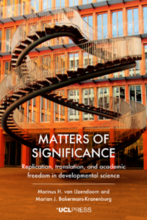Application of scientific findings to effective practice and informed policymaking is an aspiration for much research in the biomedical, behavioural, and developmental sciences. But too often translations of science to practice are conceptually narrow, ethically underspecified, and developed quickly as salves to an urgent problem. For developmental science, widely implemented parenting interventions are prime examples of technical translations from knowledge about the causes of children’s mental distress. Aiming to support family relationships and facilitate adaptive child development, these programmes are rushed through when the scientific findings on which they are based remain contested and without ethical grounding of their aims.
In Matters of Significance, Marinus van IJzendoorn and Marian Bakermans-Kranenburg draw on 40 years of experience with theoretical, empirical, meta-analytic and translational work in child development research to highlight the complex relations between replication, translation and academic freedom. They argue that challenging fake facts promulgated by under-replicated and under-powered studies is a critical type of translation beyond technical applications. Such challenges can, in the highlighted field of attachment and emotion regulation research, bust popular myths about the decisive role of genes, hormones, or the brain on parenting and child development, with a balancing impact for practice and policymaking. The authors argue that academic freedom from interference by pressure groups, stakeholders, funders, or university administrators in the core stages of research is a necessary but besieged condition for adversarial research and myth busting.

